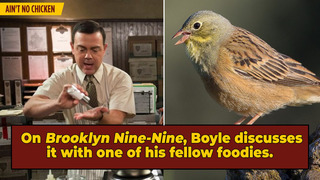The Creepiest Dish In French Cuisine (Is Eating A Lil' Bird In One Bite)

Is it just us, or is TV weirdly obsessed with the ortolan right now? On Brooklyn Nine-Nine, Boyle discusses it with one of his fellow foodies, and rich guys on Billions and Succession have gulped them down as thematically appropriate snacks. If you're somehow unfamiliar with all three of those shows, the ortolan is a small songbird that's considered a French delicacy, but it ain't no chicken.
Modern preparation of the ortolan calls for trapping the birds while they're minding their own business and just trying to migrate and fattening them up before killing them, plucking and roasting them, and serving them whole to a diner who will devour them in one bite while wearing a napkin on their head to hide their shame. You can see why rich people are so into it: They love hiding their shame.
It didn't used to be like that, though. Once upon a time, eating ortolan was so common that it was a thriving industry in the Mediterranean island of Cyprus, who shipped out as many as 500 barrels of the stuff, each containing 300 to 400 little guys, every year. Depictions prior to the '70s feature no illicit face-stuffing or weird headwear, and even as late as the '80s, one famous French chef explained that the napkin was worn both to preserve the diner's dignity as they embark on the rather graceless act of eating an entire bird full of bones and for the more practical purpose of trapping the aromas and dimming the non-culinary senses, kind of like a delicious sensory deprivation tank. Nobody covers their face to eat fancy cheese, though, so it seems like it was mostly the former.
Don't Miss
In 1979, though, hunting ortolans was banned by the European Union because, well, people were eating them into extinction. It was only then that shoving a whole bird in your mouth began to take on a seedy air. The black market that rose in the wake of the hunting ban far outpaced the EU's capacity for enforcement, and prices shot up as high as $200 a bird.
Preparation got more luxuriously brutal, depending on who was in charge and who you believe. The birds were kept in total darkness or blinded so they'd gorge themselves on carbs until they were two or three times their previous size, just like you do over the dark days of winter break. They were killed by drowning them in fancy brandy and then left there to soak it up before roasting. The napkin took on all kinds of weird Biblical significance of hiding the indecent act of gluttony from God, which weird Frenchmen and TV writers alike found metaphorically resonant.
Certainly, none of this stopped anyone who had the connections from craving an aviary appetizer. If anything, the requirement of having connections just made it more appealing to people in the habit of collecting connections. Anthony Bourdain happened upon some of the smuggled poultry at a backroom private dinner in New York and wrote about what he considered a transcendent experience in thoroughly unappetizing detail in his memoir, Medium Raw.
And while then-President of France Francois Mitterrand lay dying of prostate cancer in 1995, before consuming the bird was outlawed, he planned a lavish New Year's dinner for himself that included oysters, foie gras, and forcing his chef to call around until he could find enough ortolans for the President's whole party, two of which he ate himself. It was a true last supper, as the President didn't consume anything else in his remaining eight days, apparently determined to die with the taste of transgression on his lips. We should all be so lucky.
To this day, a diehard quartet of Michelin-starred French chefs have been lobbying the government pretty much since the bird was protected to allow them to serve it in the Landes region, the traditional seat of ortolan capture, just one weekend every year. "We want to be able to do this so as not to lose all the beautiful things that make up the history and the DNA of French cooking," said chef Michel Guérard in 2014.
You know what's great, though? Croissants. What's wrong with croissants, guys?
Top image: Pierre Dalous/Wikimedia Commons